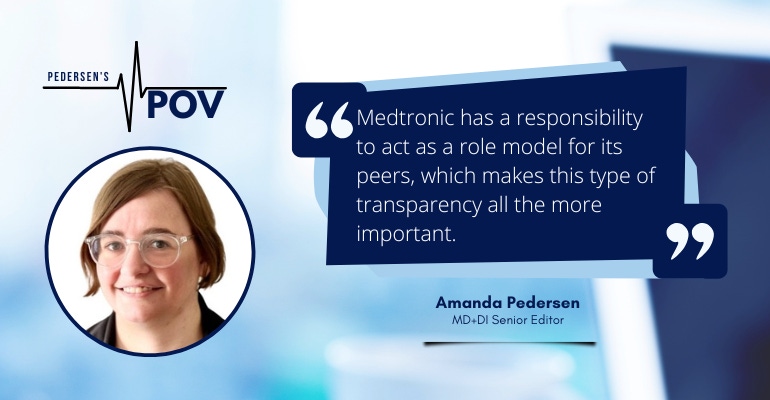Medtronic Takes a Hard Look in the Mirror
Being transparent about vulnerabilities is easier said than done in medtech – but if Medtronic can do it, any company can.
June 12, 2023

A few weeks back, after reading my column on Star Wars Lessons from Medtech, my husband turned to me and asked, "Why don't your columns ever end?"
Ouch. Talk about an ego check.
It was a fair question though. It made me realize that, after 20 years of mostly hard news writing, I've become accustomed to just giving readers the 5 Ws (who, what, where, when, and why) and calling it a day. But in commentary, the ending needs to do more heavy lifting. The reader should be left with a sense of satisfaction in having gained some value from reading the piece in its entirety.
Sometimes you need to take a hard look in the mirror in order to grow. In the business world, this reflection tends to come from a SWOT analysis (strengths, weaknesses, opportunities, threats). And while I suspect most medtech companies are familiar with this strategy, the industry could gain a lot from being more transparent about its own vulnerabilities. That's not always easy in a highly regulated field where there's an underlying fear that showing any sort of weakness will bring unwanted FDA attention.
Every now and then, however, a company will surprise me. The most recent case in point comes from Medtronic.
Speaking at Cowen and Company's annual healthcare conference in March, Medtronic CFO Karen Parkhill admitted that medtech has not historically been best-in-class manufacturing and supply chain operators. It was refreshing to hear such candidness from one of the industry's top executives.
And she's right, of course. One of the most painful lessons from the pandemic was the awareness of how many weak links are in the global supply chain, especially in medtech. Before COVID-19, many large OEMs were shockingly blind to their supply chain. They didn't even know, in some cases, exactly who was in their supply chain at every level.
Medtronic's manufacturing and supply chain operations used to be very decentralized, Parkhill told Cowen and Company's Josh Jennings during the event.
"We had nine different and distinct supply chain groups," she said. "We had four different and distinct manufacturing groups, and we've now consolidated that into one each. And we brought in place new leadership from outside of our industry in ops and supply chain."
It didn't escape me that she said this new expertise came from outside of the industry, which makes sense if the company truly wants to drive change.
"We think it's going to be a competitive advantage going forward," Parkhill said. "But we're still in the early innings of that transformation."
Medtronic's new ops leadership has put in place better systems and tools to help the company better forecast both supply and demand planning, she said. The company also plans to further consolidate its supply chain.
"During the supply chain impacts that hurt us and many other companies out there, it was very visible to us that we had way too many suppliers," Parkhill said.
How many suppliers is too many for a company of Medtronic's size and scope? Before the pandemic, Medtronic had more than 1,900 suppliers.
"And so, as we consolidate our suppliers, we're going to become even more important to them," Parkhill said. "We're going to expect them to invest and innovate with and for us, and I think that's going to help us a lot going forward."
Her acknowledgment of these weaknesses and the steps being taken to address them are a breath of fresh air in an industry that often shies away from exposing vulnerabilities. As the world's largest medical device company, Medtronic has a responsibility to act as a role model for its peers, which makes this type of transparency all the more important. It also keeps Medtronic accountable for seeing this transformation through, much like my story at the beginning of this column keeps me accountable for ensuring that you are left with a satisfying end.
There, satisfied?
About the Author(s)
You May Also Like



.png?width=300&auto=webp&quality=80&disable=upscale)
